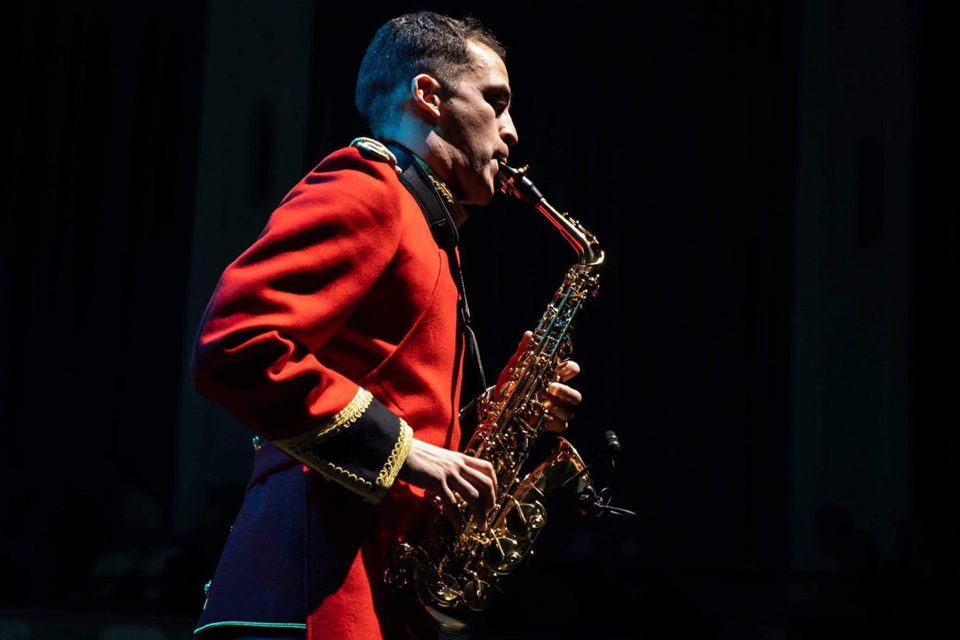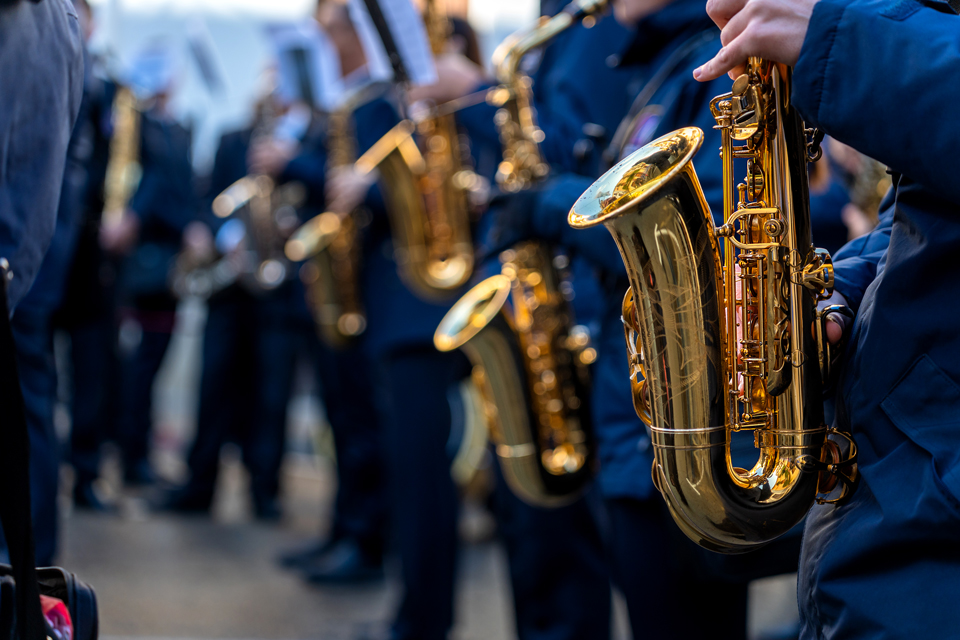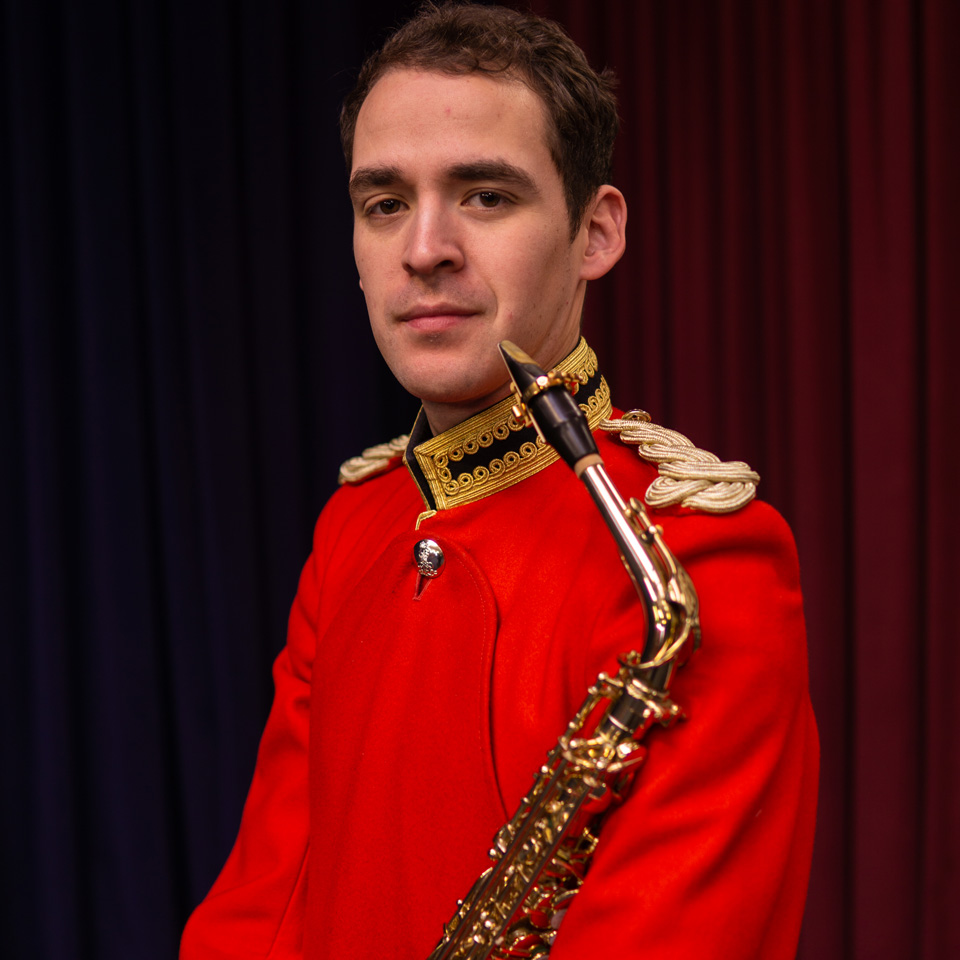Army Musicians: A Unique Career Path
7th February 2022Fancy an exciting life as an Army Musician? This unique career option is well worth exploring if you want to experience the thrills and spills of a professional musical life. Here’s Saxophonist Paul Lamstaes of the Household Cavalry Band to tell us all about his journey into the Royal Corps of Army Music…
Joining the British Army as a musician doesn’t always seem like the most obvious choice of career when mentioned in conversation. What if I also said that you can play music whilst riding a horse? Most people would probably need to see it to believe it. It is however a legitimate career path individuals can take, should they choose to join British Army Music.

Application Process
The process can be arduous. My application and selection took approximately six months from the start to the beginning of basic training. At the time, I was completing a Master’s degree, which worked well for myself as it meant the anxiety of awaiting the outcome of my application and selection was basically non-existent. In retrospect, I didn’t want to freelance at the end of my studies.
Being a saxophonist, work was and is sparse. The best and most experienced, respectively, are in the jobs that I truly wanted. I had to put this into perspective as I didn’t want to set myself up to fail after my studies. Believe me, I still have jobs I aspire to be in, in the far future, but the wealth of experience I’ve gained through being in the Army has been invaluable.
Unique Experiences & Training
For instance, one of the many examples is completing riding school. Being a musician in the Band of the Household Cavalry, we all go through equine training – a five-month course that teaches the individual about horse welfare, how to ride and how to clean the person and horse’s kit. It is a course that I heard much about beforehand, but nothing truly prepares you for those five months. The days are a bit like groundhog-day consisting of early mornings, turning over the horse’s bedding, a riding lesson, then cleaning kit whilst still tending to the horses. This might sound monotonous, but upon reflection the most exciting part of the days were the horses. They are incredible, spontaneous animals to be around that I now have the privilege to ride. Also, you are taught to value your time.
Administrating yourself effectively is a major part of how easy or hard the next few months may be. You are cleaning kit around people who are experiencing the same as you, which plays in everyone’s favour as you keep morale high through sharing individual stories as well as sharing comical moments of the days. It is something I would recommend solely on the stories that come out of it.

Life Lessons & Career Path
The journey from music college into British Army Music comes with a number of reasons, thought processes and life experiences. All of these coincide with one another. Let us begin with the financial stability a career in the Army could provide myself with. As previously mentioned, a freelancing lifestyle would’ve been incredibly challenging to gain work. The stability of income was attractive.
Next was an experience that influenced me greatly in my decision to join the Army. In my final year studying, I attended the Eastman School of Music on an exchange programme. ‘Artistry’ was a term used regularly by all my professors I was fortunate enough to be taught by. All lessons put an emphasis on the importance of individuality and opinion, teaching us that everyone’s viewpoint matters whether you agree or not.
With this in mind, I started to think about music differently in terms of what voice I had and what I could give to the world, whomever I performed to. Furthermore, it was apparent that music was accessible for everyone. Music was for the purpose of uniting the community. Concerts were free to students and the public, which meant most concerts would be to a packed crowd, subsequently creating a supportive environment to perform in.
These are only brief points from the huge amount I learned from being at the school, but I took away two words from my time there that I will value for as long as I have music in my life – ‘Artistry’ and ‘Community’. The former unleashed a confidence in my playing that enabled experimentation with sound colours. By this, for me sound is thick and thin, like shades of a colour or inflections of the human voice. No matter whom I listen to or how I play a piece of repertoire this is predominantly what my ears are listening for and are drawn to. This for me is what makes music most enjoyable, simply playing around with different sounds.
The latter term is one that I believe to be so important. Without a cohort of people creating a community, we as musicians cannot begin to share what we have to say. ‘Community’ doesn’t only mean an audience to perform to. It also includes the people we collaborate with to make music. Both ‘Artistry’ and ‘Community’ are aspects I have been able to continually develop and explore through my career choice.

Hard Work & Setting Standards
My years of studying had me going through all the notions – from a self-defeatist attitude when things were going terribly, wanting to drop out, to outer body experiences when things went well. Finding that perfect reed, the right saxophone – I’ve had a few – and the right neck strap are so vital! But having these things alone didn’t make music satisfying, even on a good practice day.
Upon returning to the UK from Eastman, I felt like I knew exactly what I wanted from music, which was to keep playing and performing. Also, I wanted to learn new skills that would provide new challenges and responsibilities in a job as well as life. British Army Music provided this platform.
Looking back at my time at music college, my journey began solely about myself – what could music give to me? By the end of my studies, it was about collaboration – what could I give to music? This was the last brick that made that ‘bridge’. Being outside of the music college environment for a few years now, I’ve had time to reflect. Such institutions come with its own pressures. These pressures, for me, mainly stemmed from how I interpreted the environment. I realised I was surrounded by musicians that pushed themselves technically and aspiring to be musically exceptional. It was a stimulating seven years of education. This environment acted as a catalyst, driving me to the standard I am today.
A Job Like No Other – Army Musician
Through joining British Army Music, my enjoyment for music has augmented. It sounds counteractive, but stepping away from music for fourteen weeks during basic training was a breath of fresh air. It was an early sabbatical in the grand scheme of things. My only focus was training to become a soldier. This is what all serving individuals are first and foremost. This is a huge commitment, but to wear the uniform is something I’m proud of and is something I understand I have earned. It is a feeling like no other. At times, moments have been truly surreal, such as bringing the streets of London to a complete halt in ceremonial dress and on horseback, returning to Knightsbridge after the Lord Mayor’s Show. In terms of the career as an Army Musician, I have had performance opportunities concerning ensemble and solo playing I couldn’t have imagined doing. Literally world-renowned stages and venues.
Ultimately, such a decision isn’t going to happen overnight. It has taken myself just beyond thirteen years to take this step into British Army Music. I have since found myself surrounded by a highly supportive network of people that only want to see you succeed. I see that my career ambitions contribute hugely to the development of skills that will enable me to someday achieve my life goals and more. Through continuing my path in music via the British Army, it has only been a positive and rewarding experience that I would recommend as a viable option to any musician considering a career in music.
- Musician Paul Lamstaes of the Household Cavalry Band, Feb 2022